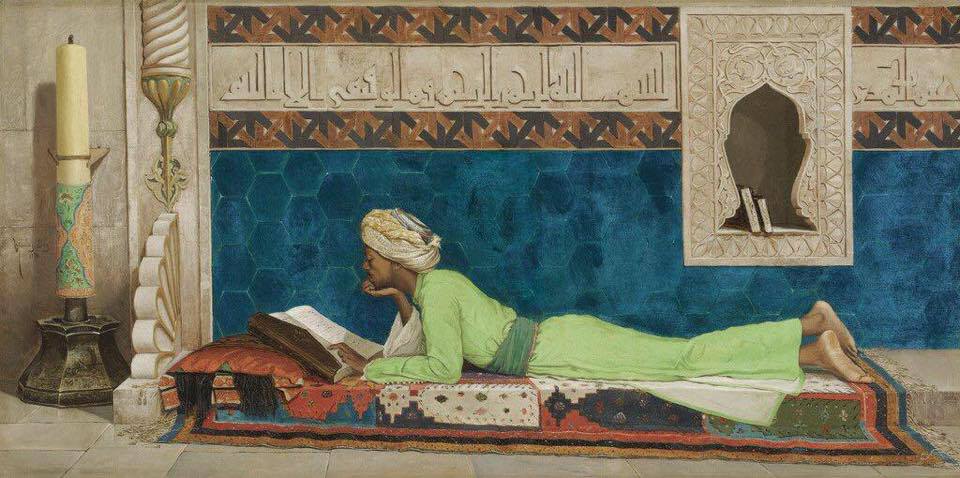
 I spent a few years learning with various teachers and attending lectures around New York and thereafter traveling to Jordan to sit in on the majalis (learning sessions) there. I’ve been blessed to learn a lot from my teachers and am forever grateful to them. Having the freedom to travel and to study takes time and I was blessed to take that time because I do not have a job or a family of my own. But many people are not in a similar scenario. Though it has been stressed to me throughout the years the importance of having a teacher to learn with, the idea of sitting for hours with a teacher and learning a text from beginning to end isn’t a real possibility for many.
I spent a few years learning with various teachers and attending lectures around New York and thereafter traveling to Jordan to sit in on the majalis (learning sessions) there. I’ve been blessed to learn a lot from my teachers and am forever grateful to them. Having the freedom to travel and to study takes time and I was blessed to take that time because I do not have a job or a family of my own. But many people are not in a similar scenario. Though it has been stressed to me throughout the years the importance of having a teacher to learn with, the idea of sitting for hours with a teacher and learning a text from beginning to end isn’t a real possibility for many.
What is the reality for most of us is that if we make an effort we could probably gain a lot by doing a little each day -as long as we have a plan. My advice is just because you don’t have a teacher in the traditional sense doesn’t mean you can’t acquire tradition knowledge and an orthodox understanding over time. So how is this possible? Foremost with du’a and possibly with these following six steps.
- Read traditional books. Ask a scholar you know and trust (or a learned person -for example, that guy you know that spent two years in Egypt studying Islam) for a recommendation on classical Islamic texts. Why classic texts? Well for one, as Sheikh Nuh (May God preserve him) states in the beginning of his translation of Reliance of the Traveller: “For most nontraditional works seen up to the present have been one man efforts, while the classical texts have been checked and refined by a large number of scholars, and the difference is manifest” (P. viii). Secondly, the scholars of today pale in comparison to scholars of the past -and they’ll be the first to tell you. And thirdly the works of the past are far more accessible -many classic books have a small summary of the original text (or subject matter), the longer text for further explanation, and commentary by other scholars making it easy to gain both a overview and an in depth understanding of the text/subject.
- Keep in touch with any scholar. You may be asking “who and how?” Firstly, a scholar that has a basic knowledge of fundamental subjects in Islam. How would you know? Just go to the bio on their website, friend/follow them on Facebook and get a sense of what they’re about, or ask people who know them. Thereafter keep their email (or message on Facebook) and ask them questions. Ask them whatever you’re sure you don’t understand from the text and need further explanation. Of course many scholars are busy (and it doesn’t have to be a “scholar” just anyone with knowledge) and may not reply so try to contact about ten, inshaAllah, one of them will be willing to help.
- Strike up conversation with people of knowledge about the text you’re reading to make sure you have the correct understanding. This is for the parts of the you’re sure you understand but because you’re not in formal circles of knowledge you don’t get the feedback necessary to confirm you’re understanding the text as it should be understood, going over it with others in a causal manner will help to confirm you really understand what’s being conveyed in the text.
- Approach independent learning with an understanding that studying with a teacher is far superior and open your heart to the idea that when the opportunity to learn with a teacher presents itself you will take it. Maybe in the near future your time will open up and you’ll find a class or a teacher available and squeeze in those lessons you were too busy to learn before. And if you’ve done steps #1- 3 you’ll be able to utilize those teachers that you created a relationship with previously and build on what you know.
- Think about learning online. You may not feel you have time to learn online either but look in to different programs and see how much time they allow you to take. For example, the class may be weekly for 10 weeks and maybe you aren’t able to complete it in ten weeks, ask them how long they allow students to access coursework or register for the class again the following semester and continue where you left off. Online learning (ex: seekergudance.org, qibla.com) allows students access to traditional knowledge and seekers from the comfort of their home so it’s a viable option even for the busy soul.
- Be consistent. Learn a little daily (or weekly) and you’ll be surprised how far you come over time. There’s no need to feel like it’s all or nothing, the most important tool is consistency. As the beloved messenger of God, peace be upon him, has said: “Take up good deeds only as much as you are able, for the best deeds are those done regularly even if they are few.” Sunan Ibn Majah 4240





Recent Comments